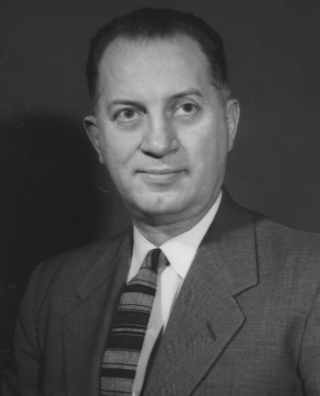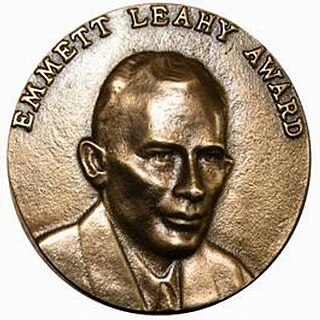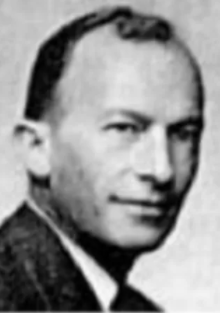In archival science, a fonds is a group of documents that share the same origin and that have occurred naturally as an outgrowth of the daily workings of an agency, individual, or organization. An example of a fonds could be the writings of a poet that were never published or the records of an institution during a specific period.

Trudy Huskamp Peterson is the first woman to hold the position of Archivist of the United States. She was the Acting Archivist of the United States from March 25, 1993 to May 29, 1995.

Archival science, or archival studies, is the study and theory of building and curating archives, which are collections of documents, recordings, photographs and various other materials in physical or digital formats.
A finding aid, in the context of archival science and archival research, is an organization tool, a document containing detailed and processed metadata and other information about a specific collection of records within an archive. Finding aids often consist of a documentary inventory and description of the materials, their source, and their structure. The finding aid for a fonds is usually compiled by the collection's entity of origin, provenance, or by an archivist during archival processing, and may be considered the archival science equivalent of a library catalog or a museum collection catalog. The finding aid serves the purpose of locating specific information within the collection. The finding aid can also help the archival repository manage their materials and resources.
Charles M. Dollar, an internationally recognized expert on the life cycle management of electronic records, particularly electronic records archiving, pioneered research into digital preservation of electronic records.
The Australian Series System is an archival control or metadata system, used primarily to describe records in the custody of archival institutions. It was developed at the Australian Archives and forms the basis for the Australian Society of Archivists' committee on descriptive standards guide ″Describing archives in context″.
ISAD(G) (General International Standard Archival Description) defines the elements that should be included in an archival finding aid. It was approved by the International Council on Archives (ICA/CIA) as an international framework standard to register archival documents produced by corporations, persons and families.
The Queensland State Archives is the lead agency for public recordkeeping in Queensland, Australia. It is the custodian of the largest and most significant documentary heritage collection about Queensland.
Terence M. Eastwood is best known for his pioneering roles in archival education internationally and the creation of archival descriptive standards in Canada. He has published widely on a number of topics of importance to the development of archival theory and has lectured and presented throughout the world. His work supervising archival studies students helped craft a whole new generation of archivists who themselves have gone on to make important contributions to the field.

The International Council on Archives is an international non-governmental organization which exists to promote international cooperation for archives and archivists. It was set up in 1948, with Charles Samaran, the then director of the Archives nationales de France, as chairman, and membership is open to national and international organisations, professional groups and individuals. In 2015, it grouped together about 1400 institutional members in 199 countries and territories. Its mission is to promote the conservation, development and use of the world's archives.
Kent M. Haworth (1946–2003) was a Canadian archivist, best known for his pioneering role in the creation of archival descriptive standards in Canada. He published widely on a number of topics of importance to the development of archival theory, lectured and presented throughout the world, and was a contributing member of many national and international archival committees and associations.

The records continuum model (RCM) is an abstract conceptual model that helps to understand and explore recordkeeping activities. It was created in the 1990s by Monash University academic Frank Upward with input from colleagues Sue McKemmish and Livia Iacovino as a response to evolving discussions about the challenges of managing digital records and archives in the discipline of archival science.
Luciana Duranti is an archival theorist and professor of archival science and diplomatics at the University of British Columbia School of Library, Archival and Information Studies in Vancouver, Canada. She is a noted expert on diplomatics and electronic records. Since 1998, she has been the director of the electronic records research project, InterPARES. She has disclosed the concept of the archival bond originally initiated by Italian archivist Giorgio Cencetti in 1937.
Dr. Nancy Y. McGovern is a digital preservation pioneer. She is the 2023 recipient of the Emmet Leahy Award for Outstanding Contributions to the Information and Records Management professions. Dr. McGovern has devoted her career to developing digital records and preservation programs for a series of prominent institutions, translating those experiences into widely-used curriculum and continuing education programs to help organizations and individuals build their capacity to develop sustainable programs to preserve digital content, defining and promulgating standards-based good practice for digital archives and preservation, and engaging in research-based practice to fill gaps in good practice for digital archives and the preservation of them. She has focused on building an international community of practice for digital archives and preservation most recently with the development and promulgation of the Radical Collaboration model for working within and across domains.

Everett Owen Alldredge was an American archivist and records manager, and a leader in the American archival community.

The Emmett Leahy Award is given annually to individuals who have had major impact on the field of information management. The award has been given since 1967, and honors Emmett Leahy, a pioneer in records management.

Emmett Joseph Leahy was an American archivist and entrepreneur. He was a pioneer in the discipline of records management. After working in the National Archives and then during World War II in the United States Navy, he entered private business as a consultant in records management and as a records storage provider. He also participated in the two Hoover Commissions in improving the efficiency and effectiveness of government.
Adrian Brown is a British archivist specializing in digital records preservation. He led development of the widely used PRONOM file format registry and associated DROID software tool. He is the author of Practical Digital Preservation: A How-To Guide for Organizations of Any Size (2013).
Simon Fook Keung Chu is a former Hong Kong government official who served as acting director of the Hong Kong government archives from 1999 to 2003. After his retirement, he called on Hong Kong to enact an "Archives Law" to regulate the handling of government records.
Nolda Cira Römer-Kenepa is a Dutch historian and archivist. She served as acting governor of Curaçao from 2013 to 2019.